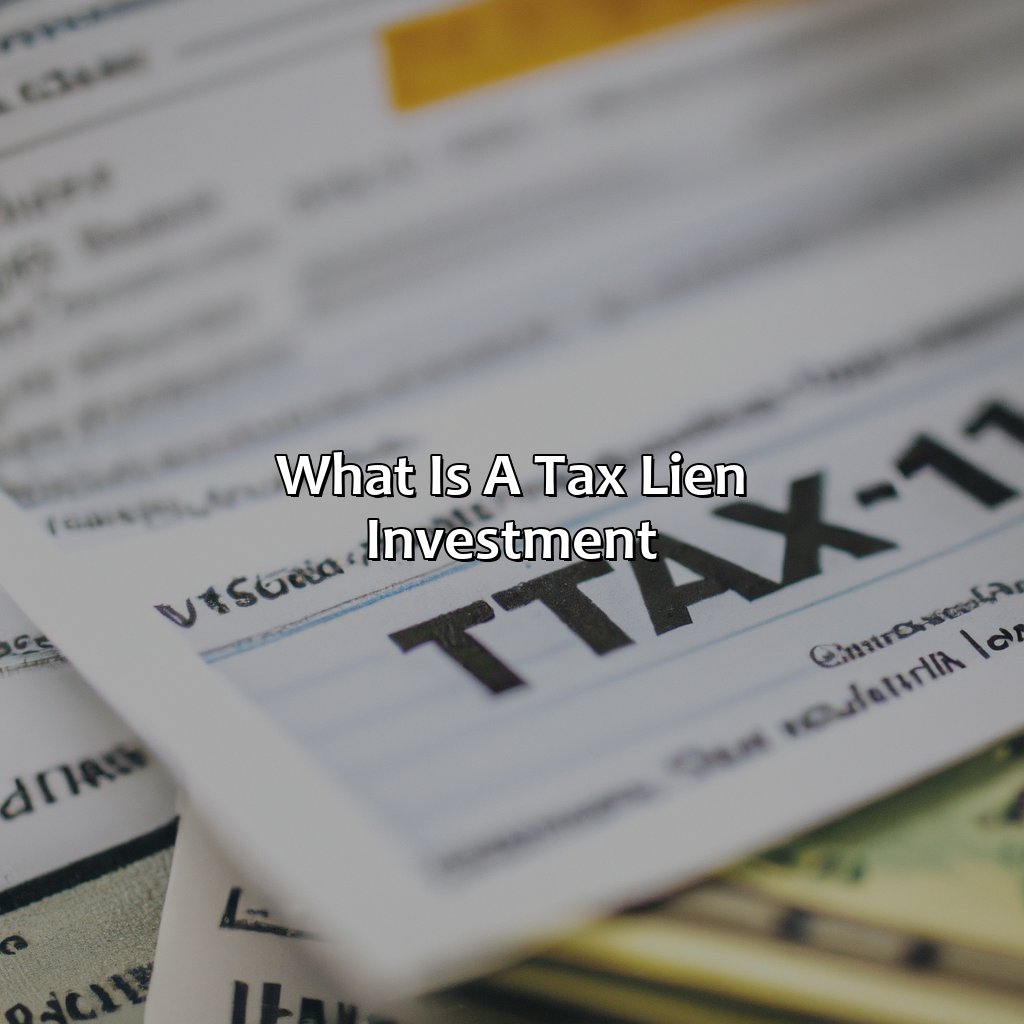What Is A Tax Lien Investment?
Key Takeaway:
- Tax lien investment is when investors purchase a government-issued certificate that lists unpaid property taxes on a specific property. This certificate allows the investor to collect the unpaid taxes, penalties, and interest from the property owner, with high returns on investment.
- Tax lien investment is a low-risk investment with priority claim on the property. In the event of foreclosure, the investor has the first right to claim the property, making it a secured investment.
- Although tax lien investment has its advantages, there are risks involved, including redemption risk, property condition, and legal issues. It is important for investors to conduct thorough research before investing.
Are you looking for ways to expand your financial portfolio? Investing in tax liens presents an interesting opportunity for you to do just that. You’ll discover the basics of a tax lien investment here, and how they can help you reach your financial goals.
What is a Tax Lien Investment?
Grasp the world of tax lien investment! This guide will help you comprehend its definition and how it works. Explore its concepts in two sub-sections:
- Definition
- How it Works
Get ready to discover the essence of tax lien investment!
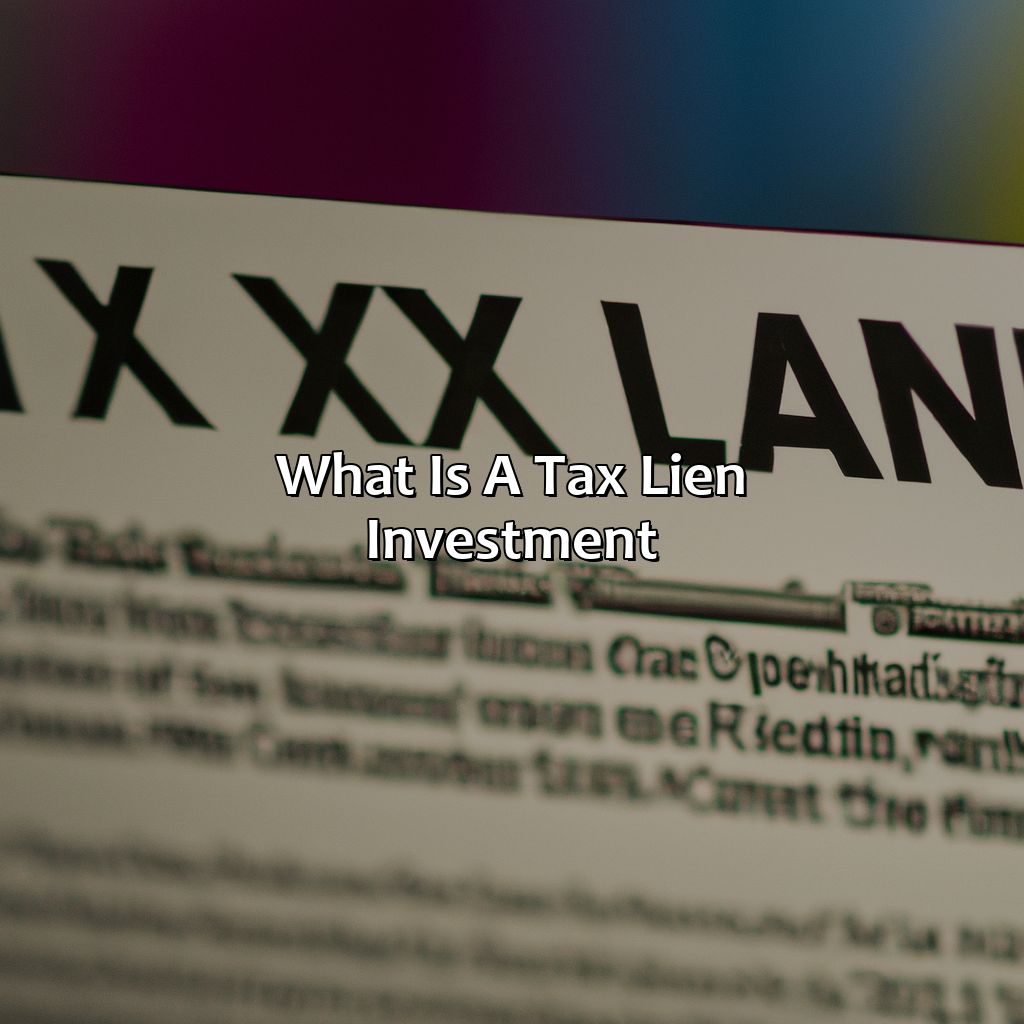
Image credits: retiregenz.com by James Washington
Definition of Tax Lien Investment
A Tax Lien Investment refers to the process of purchasing a lien against a property owner who has failed to pay their property taxes. As an investor, you have the opportunity to pay off the delinquent taxes and acquire a lien on the property, giving you priority over other creditors. This ensures that once the owner pays back the delinquent tax amount, you receive your investment along with interest or other fees.
Investors can choose to sell these liens at auction and profit from the difference between what they paid for the lien and how much it eventually sells for. There are also opportunities to obtain the properties themselves through foreclosures, mainly when owners don’t repay their debt.
It should be noted that investing in Tax Liens comes with some risks. For example, if after several years, the owner does not compensate for their owed taxes and debts, investors may lose out on their initial investment. It is essential to do thorough research on both individual states’ rules, regulations before investing in any tax lien.
Overall, Tax Lien Investment is an excellent way for investors to put their money behind specific profits with less uncertainty than traditional stock markets but requires careful consideration before investing your hard-earned cash. Don’t miss out on this potentially profitable venture; speak to a financial advisor today!
Getting rich off of someone else’s tax troubles has never been easier, thanks to tax lien investments. But be warned, playing landlord to a delinquent property owner can have its own set of headaches.
How Tax Lien Investment Works
To invest in tax liens, one can buy the tax lien certificate that is offered by local municipalities. This way, investors pay off the delinquent taxes of property owners and receive interest payments on their investments. The property owner has a certain amount of time to pay back their taxes with interest, or the investor can foreclose on the property.
Investors can typically earn a higher return compared to other types of investments due to the lack of competition and risk involved. Tax lien investments are also secured by the property itself, making them less risky for investors.
It’s important to note that each state has different laws and regulations regarding tax lien investing. Investors should thoroughly research before making any investment decisions.
In some cases, investors may have the opportunity to purchase properties at a discounted price through tax deed sales. This occurs when a property owner fails to pay their taxes for an extended period of time, leading to the government selling the property as a means to recover lost revenue.
According to Forbes, tax liens yielded an average annual return of 10-12% over a 5 year period from 2011-2016.
Putting your money into tax liens may be the only time the government owes you.
Advantages of Tax Lien Investment
Want to know why tax lien investment is great? It’s safe, plus you could make a lot of money, and have first say on property. To find out more, check this section out. Make informed financial choices!
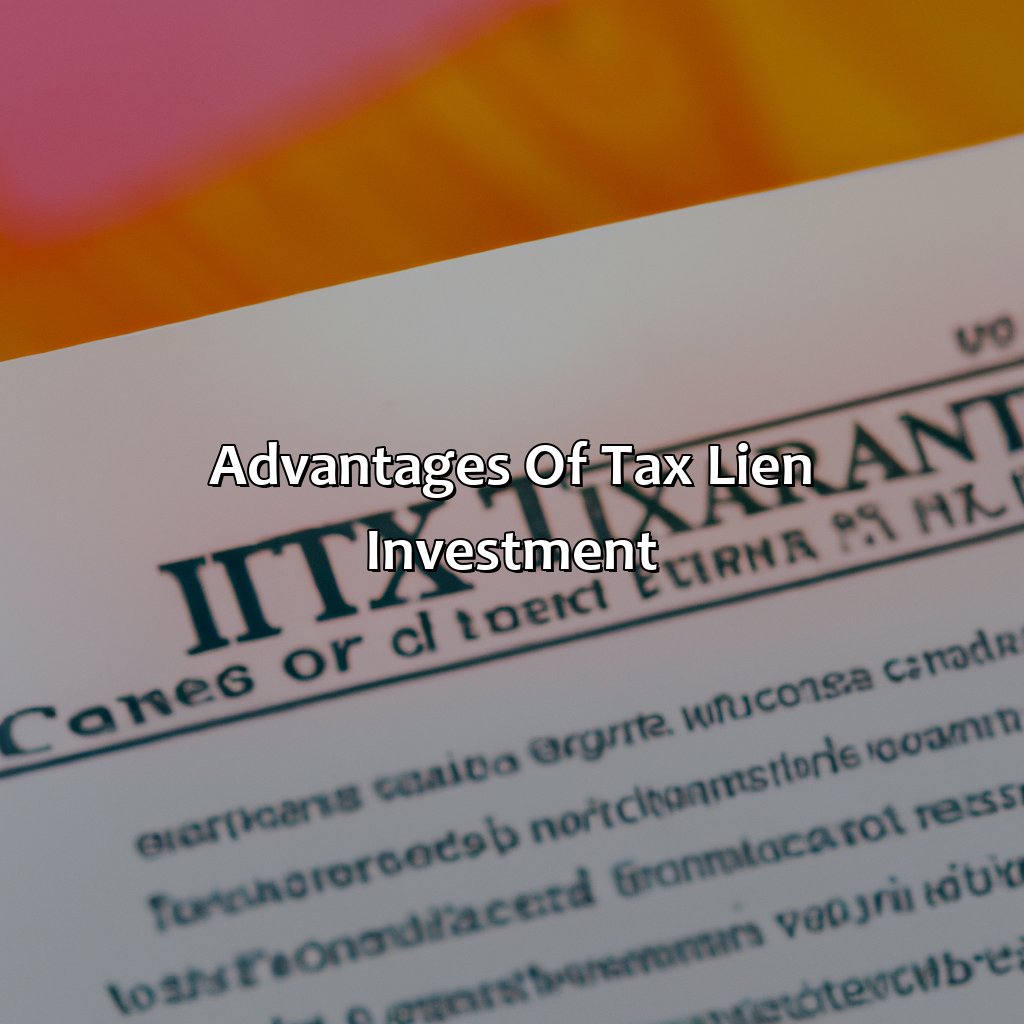
Image credits: retiregenz.com by Yuval Duncun
High Returns on Investment
Investing in tax liens is a profitable venture due to High Yield on Investments. There are several reasons why investing in tax liens is a smart financial decision.
- High Annual Interest Rates: Tax lien investments offer annual interest rates as high as 18-36%. This profit is higher than most other investment options available.
- Guaranteed Return on Investment: The interest earned on a tax lien investment is guaranteed by law, ensuring that the investor receives their return at the end of the investment period.
- Low Initial Investment: Investors can start with a low initial investment, making it an accessible option for all levels of investors.
- Tax Advantages: Tax lien investments offer tax advantages such as avoiding capital gains taxes and income taxes on the returns received from the investment.
- Possibility of Ownership: If the property owner does not pay outstanding taxes, investors have the opportunity to obtain ownership of the property through foreclosure proceedings.
Furthermore, investing in tax liens provides additional benefits such as passive income, diversification of portfolio and little to no competition.
Hence, considering this lucrative option can benefit diversified portfolios seeking extra yields from secured and legally protected investments.
Investors seeking higher returns sometimes hesitate to invest due to complexity or perceived difficulties involved. They may also require guidance or some suggestions before entering into such investments. To address these concerns, it is recommended that individuals should gain sufficient knowledge about laws in their respective jurisdiction governing such investments and conduct ample due diligence before selecting a particular asset. In addition, diversification across several assets can reduce risks and ensure more stable returns over time. Safe bets include local municipalities or those major states like Florida/New York linked with strict regulations for protection against bankruptcy and/or default risk.
Investing in tax liens is like playing the lottery, but with better odds and no need to leave your couch.
Low Risk Investment
A tax lien investment offers a high level of security with low risk. This type of investment is considered safe as it is backed by the government and property owners’ assets. In case of default, investors are reimbursed with all the unpaid taxes plus interest.
Moreover, tax lien investing also has competitive returns compared to other investment options like stocks and bonds. These investments typically have fixed interest rates which make them more appealing for long-term wealth creation.
Furthermore, unlike other investment opportunities, tax lien investing doesn’t require a large capital investment or a significant amount of time commitment to oversee the investments daily. This makes it an ideal option for those looking to diversify their portfolio efficiently.
A true story illustrating the advantages of this type of investment was when John invested in a tax lien based on his attorney’s advice. The property had outstanding property taxes, but ultimately, the owner redeemed the property before John exercised his right over it. Despite this situation, John received an 18% return on his initial investment.
Who needs a T-Rex when you can have a tax lien? Priority claim on property means you get to be the king (or queen) of the investment jungle.
Priority Claim on Property
Having a superior right and claim over other liens, a tax lien investment provides investors with a priority claim on the property. This means that in case of foreclosure or default by the owner, the investor gets paid first before any other lien holder or creditor.
Investors must conduct thorough research and analysis on the property’s value, location, and potential before buying a tax lien investment. Upon successful acquisition, they can earn lucrative interest rates as high as 18% and even acquire the property at a discounted rate compared to its market value.
Furthermore, with an emphasis on due diligence, investors can significantly lower their risk exposure while enjoying steady returns from their investment.
Pro Tip: Before investing in tax liens, understand each state’s unique laws and regulations to ensure a smooth investment journey.
Be prepared to face the consequences if you’re not ‘lienient’ with your tax lien investments.
Risks of Tax Lien Investment
Investing in a tax lien carries potential risks. What are they? Redemption troubles, property condition issues, and legal matters. It is essential to investigate these thoroughly before taking the plunge. So, look into the sub-sections that focus on the challenges you may face as a tax lien investor.
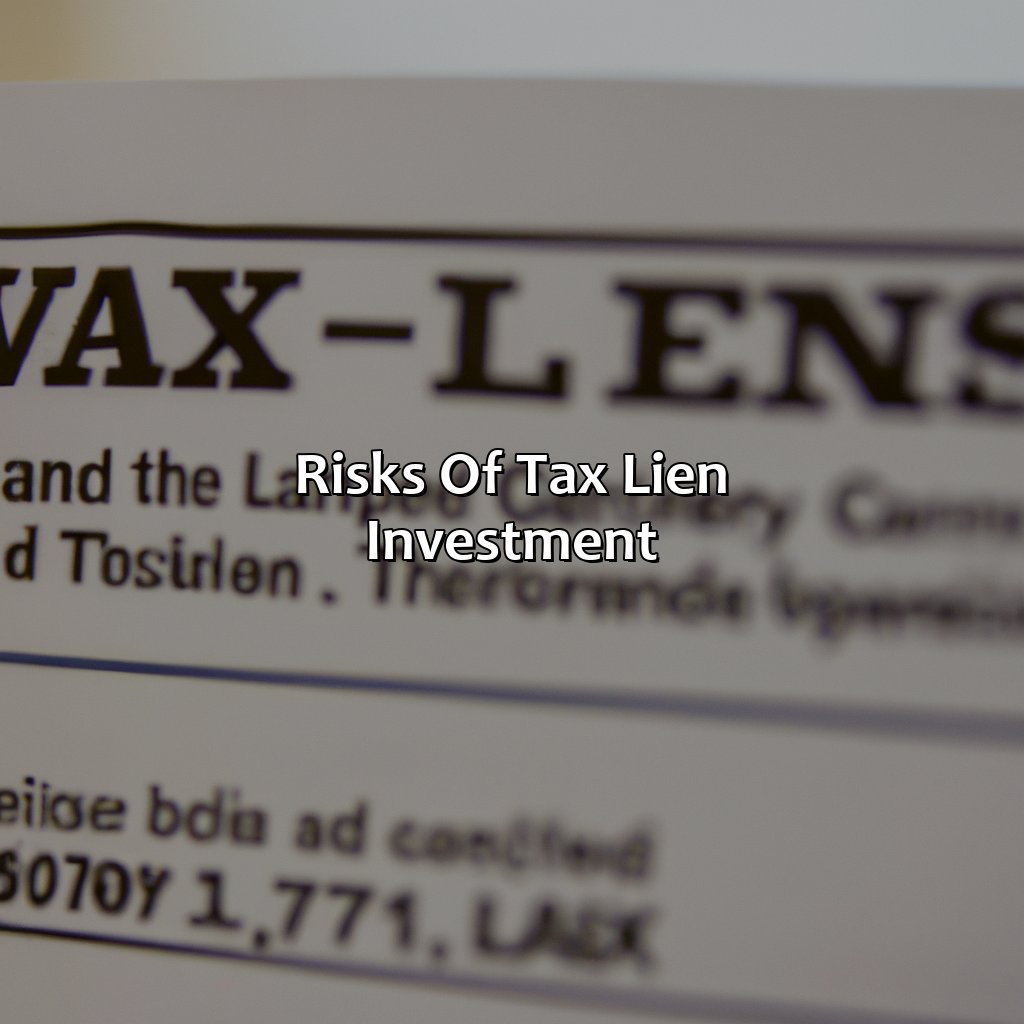
Image credits: retiregenz.com by Harry Washington
Redemption Risk
Investors face the risk of losing out on returns when investing in tax liens. This occurs when the property owner redeems the lien, thereby securing the interest and principal paid to the investor. In cases where investors fail to bid on liens with higher interest rates or overlook liens with redemption periods that are too short, they may experience high rates of redemption risk.
To mitigate this risk, investors need to conduct thorough research on properties before bidding and avoid investing in liens with high chances of redemption. Moreover, investors should diversify their portfolio across different states to reduce exposure to any single state’s economy.
It is essential to note that even experienced investors can make mistakes; research is still vital for those looking for profitable investments.
Without adequate education regarding investment strategies, inexperienced investors risk missing out on incredible opportunities while risking profits on risky bids. Take extra care when analyzing tax-lien investments and consult a financial expert for further guidance.
If you’re into tax lien investments, just remember: don’t buy a property that’s one step away from being condemned. It’s a risky investment, not an episode of ‘Hoarders’.
Property Condition
Considering the state of a property before investing in tax liens is crucial. A careful analysis of a property’s physical condition, compared to other available options, can save investors from losing money.
The property’s upkeep and any potential repair expenses must be fully investigated before investing in tax liens. Any fundamental fault or hidden damage, like infrastructure problems, might make it unfavorable to invest in such properties.
A wise investor should also evaluate the general outlook of the neighborhood where the property is located. This ensures that investment income will not be affected by surrounding factors like population decline or natural disasters.
Pro Tip: Investors should take extra caution when investing in dilapidated properties as they incur higher repair costs and may yield lower returns than initially projected.
Why hire a lawyer when you can just invest in tax liens and watch your legal troubles multiply like Gremlins in a swimming pool.
Legal Issues
When it comes to investing in tax liens, there are certainly legal issues that potential investors need to be aware of. One such issue is the risk of delinquent property owners filing lawsuits against lien holders for improper notifications or procedures. This can result in costly legal battles and potential loss of investment.
Additionally, it’s important for tax lien investors to understand the various state laws and regulations regarding liens. Each state has its own specific guidelines, which can vary widely. Some states have strict redemption periods and interest rates, while others allow for more flexibility.
Furthermore, it’s essential for investors to conduct thorough due diligence before investing in tax liens. This includes researching the property owner and verifying ownership information, as well as understanding any outstanding debts or liens on the property.
A true story that highlights these risks involves a tax lien investor who purchased a lien on a property without realizing that there were several other outstanding liens on the property. When the investor attempted to foreclose on the property, they discovered that they were still responsible for paying off all of the other liens before obtaining full ownership. This resulted in significant financial loss for the investor.
Get ready to gamble your way to riches with these steps on how to invest in tax liens.
How to Invest in Tax Liens
Want to invest in tax liens? Here’s what you need to do!
- Research county laws and auction procedures.
- Figure out your budget.
- Go to tax lien auctions.
Follow these steps and you’ll be a successful tax lien investor!
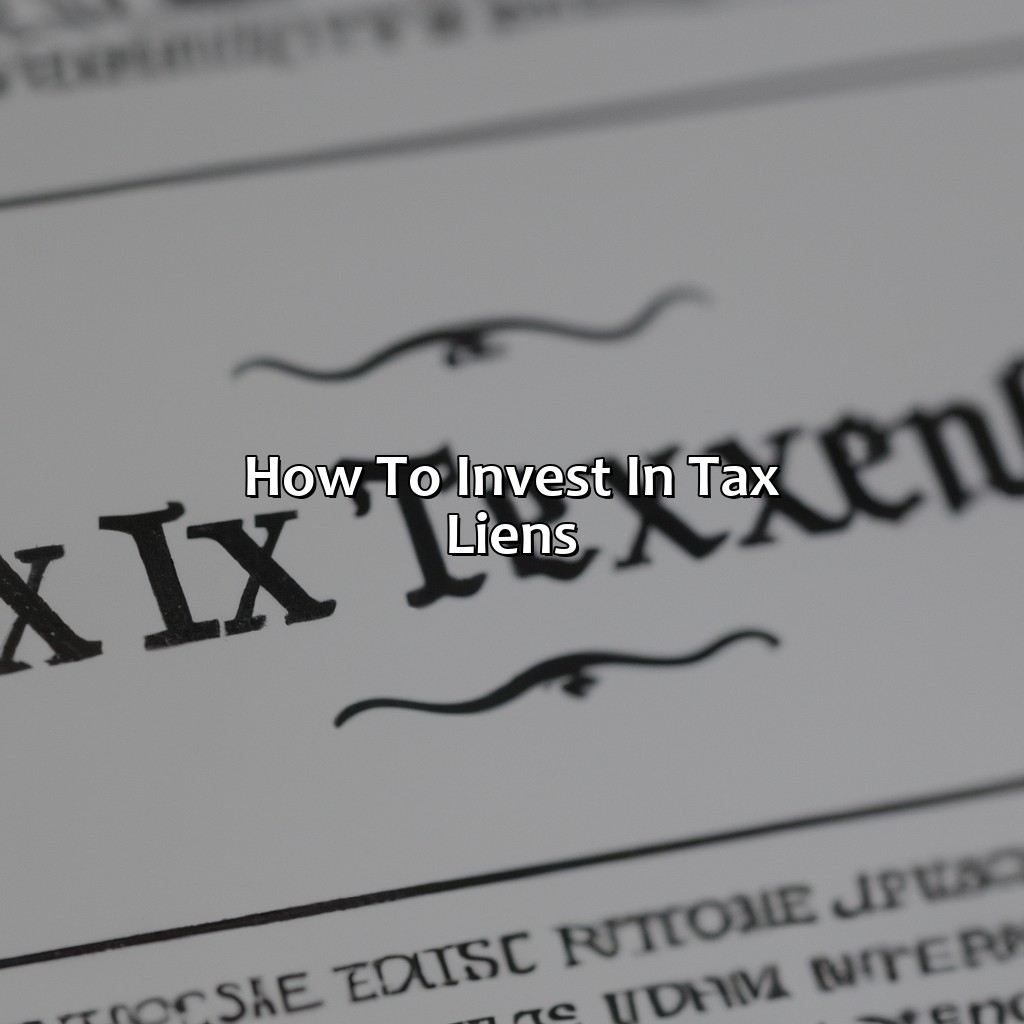
Image credits: retiregenz.com by Harry Washington
Research County Laws and Auction Procedures
To make a successful investment in tax liens, it’s vital to understand the legal parameters surrounding auctions. Familiarize yourself with the auction procedures and county laws before participating in the process.
Take time to thoroughly research county-specific regulations as they may differ from one location to another. Attend seminars or seek expert advice on how auctions are conducted and how properties are sold at tax lien auctions.
Understanding the bidding, redemption, and foreclosure process is crucial for determining whether listing on a property is worth your while or not. Properly researching for outstanding liens, unpaid taxes or any other encumbrances will ensure that you avoid investing in properties that have no potential for growth.
A case study of Joe helped cover unique details about how improper research can lead to failure while investing in tax liens. Joe purchased a piece of land for $10K without proper due diligence only to find out later it had previous zoning violations making his purchase valueless. Therefore, it’s important to conduct thorough research before buying a tax lien property.
Properly understanding the local auction system is instrumental in this investment; don’t rush into things. Remember that your desired outcome is not just purchasing any property but purchasing one with potential benefits attached to it, hence conduct background checks and learn all about auctions to make informed decisions.
Remember, investing in tax liens is like a game of Monopoly, but instead of passing Go and collecting $200, you’re paying taxes on someone else’s property.
Determine Investment Budget
Determining the budget for investing in tax liens is crucial to avoid financial loss. Here’s a guide on how to calculate your investment budget.
- Assess Financial Capability – Before investing, analyze and evaluate your financial condition as it determines the amount you can invest.
- Select Interest Rate – Check the available tax lien options and choose the interest rate according to your budget and monetary goals.
- Create a Budget Plan – Once you assess your finances and select the desired interest rates, create a budget plan accordingly that focuses on realistic profits with calculated expenses.
It is paramount to note that every budget plan differs from case to case, as it depends on personal financing and goals. Consider consulting a financial expert if needed.
Investing in tax liens has been around since ancient times when governments sold tax debt. In 1996, Kentucky introduced online auctions for selling these debts, which created an online marketplace for buying tax liens. Today, investing in tax liens is seen as an attractive opportunity that provides profitable returns with minimal risk if done correctly.
Don’t let the idea of attending a tax lien auction scare you, it’s just like The Hunger Games but with less killing and more paperwork.
Attend Tax Lien Auctions
Attending Auctions for Owning Tax Liens- Be a Successful Investor
Tax lien auctions are an excellent opportunity to invest in tax liens. You get the chance to buy tax liens covering unpaid taxes on real estate properties. If you attend such auctions, you can own these liens and gain interest on them. Here’s what you should keep in mind:
- Do your research before attending auction – Study the property market, assess your budget and goals.
- Learn about the auction process – Familiarize yourself with how bids will be placed and accepted at the auction.
- Bidding strategically – Place bids only that offer value for money based on property valuation.
- Follow up regularly – Make sure you follow up diligently to avoid missing deadlines for payment of property taxes.
It’s essential to understand that while investing in tax liens can get you lucrative returns, there’s no guarantee of making profits. Tax lien investing demands considerable time, effort, knowledge and experience.
To be a successful investor, always consider leveraging professional guidance while embarking into this investment space. It is best to appoint legal lawyers or attorneys who can help identify gaps like incorrect documentation or other legal aspects jeopardizing your investments. Investing in various tax lien portfolios, building goodwill with sourcing agents & financial institutions cater towards reducing risk factors too.
As we concluded here earlier, Investors must always remain well researched and cautious of their preferred jurisdictions’ regulations governing tax penalty enforcement across each bidding system.
Five Facts About Tax Lien Investment:
- ✅ A tax lien is a legal claim by the government against a property owner who fails to pay their property taxes. (Source: Forbes)
- ✅ Investing in tax liens can provide high returns, often between 6% and 18%, depending on the state and property. (Source: Bankrate)
- ✅ Tax lien certificates can be purchased at auctions held by county governments. (Source: Investopedia)
- ✅ Investing in tax liens comes with risks, including the possibility of the property owner redeeming the lien and the need for due diligence on the property’s value and condition. (Source: The Balance)
- ✅ Tax lien investing can be a passive investment strategy for individuals looking for alternative investment options. (Source: U.S. News & World Report)
FAQs about What Is A Tax Lien Investment?
What is a tax lien investment?
A tax lien investment is an investment where an individual purchases the right to collect unpaid property taxes from a property owner. When a property owner fails to pay their property taxes, the government places a lien on the property, which can be auctioned off to investors. The property owner must then pay back the investor with interest to release the lien on their property.
How does a tax lien investment work?
A tax lien investment works by purchasing the lien on a property from the government. The investor then holds the lien until the property owner pays off the outstanding taxes plus interest. If the property owner fails to pay, the investor may have the option to foreclose on the property to recoup their investment.
What are the potential returns for a tax lien investment?
The potential returns for a tax lien investment can vary greatly, as it depends on the interest rate and length of time it takes for the property owner to pay off the outstanding taxes. Some investors can see returns of up to 20% or more, while others may see only a minimal return or none at all.
What are the risks of investing in tax liens?
One of the main risks of investing in tax liens is the possibility that the property owner may never pay off the outstanding taxes, leaving the investor with no return on their investment. There is also the risk of foreclosure, which can be a time-consuming and expensive process.
How can I start investing in tax liens?
The process of investing in tax liens varies by state, but typically involves attending auction events and bidding on available liens. It is important to do research on the specific state’s laws and regulations regarding tax lien investments before getting started.
Can tax liens be sold or traded?
Yes, tax liens can be sold or traded to other investors. This allows investors to release their investment before the lien is paid off by the property owner.
